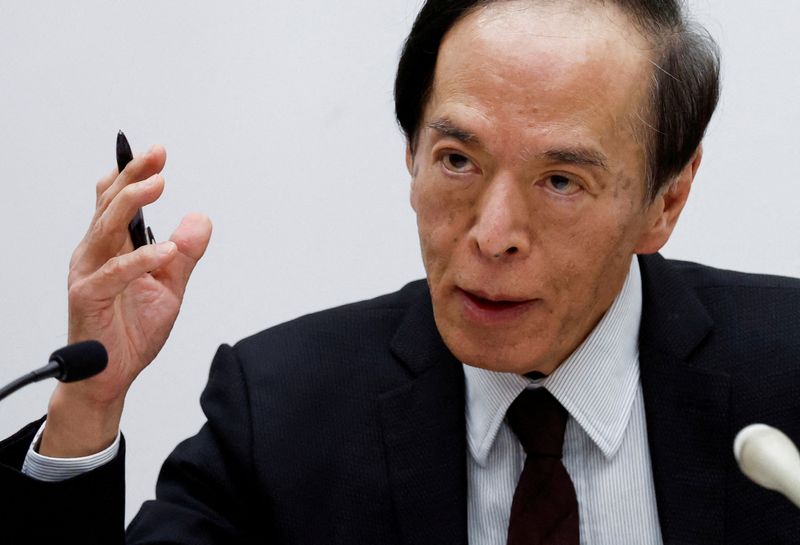By Leika Kihara and Tetsushi Kajimoto
TOKYO (Reuters) -The Bank of Japan maintained its ultra-easy monetary settings on Tuesday but signalled its growing conviction that conditions for phasing out its huge stimulus were falling into place, suggesting that an end to negative interest rates was nearing.
BOJ Governor Kazuo Ueda gave no hints on whether the bank would pull short-term interest rates out of negative territory at its upcoming meetings in March or April, as many economists expect.
But he said the likelihood of Japan sustainably achieving the bank's 2% inflation target was gradually increasing, pointing to recent steady rises in service sector prices.
"Prospects of higher wages are gradually affecting sales prices, which is leading to a gradual increase in service prices," Ueda told a press conference after the BOJ's widely expected decision to maintain ultra-low interest rates.
"If we get further evidence that a positive wage-inflation cycle will heighten, we will examine the feasibility of continuing with the various steps we are taking under our massive stimulus programme," he said.
The remarks contrasted with those made last month, when he said there was high uncertainty on whether a positive cycle of rising wages and inflation would fall into place.
The central bank's hawkish tilt triggered a rebound in the Japanese yen and pushed up Japan's short-term government bond yield to a one-month high, as investors priced in an increasing chance of an end to negative rates in March or April.
"Ueda's comments heightened my conviction the BOJ will end negative rates in April," said Mari Iwashita, chief market economist at Daiwa Securities.
"He suggested that the BOJ doesn't need to wait too long in scrutinising this year's wage outlook. Furthermore, he no longer talks about the danger of a premature exit," she said.
Naomi Muguruma, chief market economist at Mitsubishi UFJ (NYSE:MUFG) Morgan Stanley Securities, also said a policy change could be imminent.
"Ueda's rhetoric was in stark contrast to that seen in December, when the BOJ seemed to rule out the chance of an immediate policy shift."
At a two-day meeting that ended on Tuesday, the BOJ maintained its short-term rate target at -0.1% and that for the 10-year bond yield around 0% under yield curve control (YCC).
Ending negative rates, which have been in place since 2016, would be a landmark shift away from former governor Haruhiko Kuroda's radical stimulus that focused on pushing up inflation to the bank's target.
Markets are closely watching the outcome of big firms' annual wage negotiations with unions concluding in mid-March, which will set the course for smaller firms' talks and determine whether wage increases become broad-based.
Ueda said the BOJ does not necessarily need to wait until the smaller firms' wage talks conclude, in normalising policy.
In a quarterly outlook report, the BOJ left unchanged its forecast that an index gauging trend inflation will hit 1.9% in 2024 and 2025, underscoring policymakers' view the economy is on track for sustainably meeting 2% inflation.
"Consumer inflation is likely to increase gradually toward the BOJ's target as the output gap turns positive, and as medium- to long-term inflation expectations and wage growth heighten," the BOJ said in the report.
"The likelihood of realising this outlook has continued to gradually rise," the report said in a newly added phrase on prospects for hitting the BOJ's price target.
SLOW BUT STEADY
The BOJ's meeting precedes that of the European Central Bank on Thursday and the U.S. Federal Reserve next week, both of which aggressively tightened monetary policy last year and are now contemplating cutting interest rates as inflation eases.
Japan has seen inflation exceed the BOJ's target for well over a year. But Ueda had stressed the need to hold off on raising rates until there is more evidence that inflation will durably stay around 2%, accompanied by solid wage growth.
The BOJ's caution reflects Japan's 25-year history of deflation that had undermined wage growth, and prodded the central bank to keep ramping up stimulus. The last time Japan saw an interest rate hike was in 2007, a move that was later criticised by politicians as premature.
Surveys and comments from business lobbies have shown an increasing chance Japan's spring wage hikes will exceed last year's 30-year high of 3.58% for major firms - a key prerequisite set by the BOJ for exiting ultra-loose monetary policy.
Services prices have also crept up, underscoring the BOJ's view that prospects of higher wages would prod more firms to pass on rising labour costs.
But Ueda stressed that an end to negative rates won't automatically lead to the kind of aggressive, steady rate hikes seen last year in the United States, Europe and elsewhere, which spurred fears they could choke off economic growth.
"Based on our current economic forecast, even if we were to end negative rates, monetary conditions will likely remain very accommodative," Ueda said.
